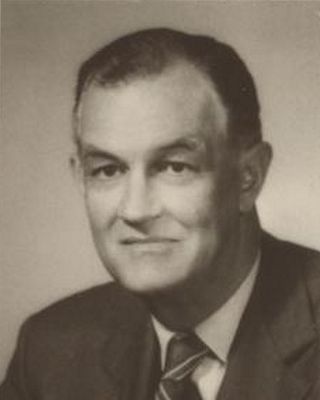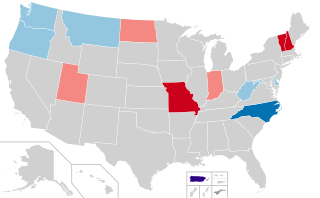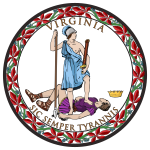
Thomas Nelson Jr. was a Founding Father of the United States, general in the Revolutionary War, member of the Continental Congress, and a Virginia planter and slave owner. In addition to serving many terms in the Virginia General Assembly, he twice represented Virginia in the Congress, where he signed the Declaration of Independence in 1776. Fellow Virginia legislators elected him to serve as the commonwealth's governor in 1781, the same year he fought as a brigadier general in the siege of Yorktown, the final battle of the war.

Mills Edwin Godwin Jr. was an American politician who was the 60th and 62nd governor of Virginia for two non-consecutive terms, from 1966 to 1970 and from 1974 to 1978.

Thomas Bahnson Stanley was an American politician, furniture manufacturer and Holstein cattle breeder. A Democrat and member of the Byrd Organization, Stanley served in a number of different political offices in Virginia, including as the 47th speaker of the Virginia House of Delegates and as the Commonwealth's 57th governor. He became known for his support of the Massive Resistance strategy to prevent school desegregation mandated by the United States Supreme Court's decisions in Brown v. Board of Education, and Virginia's attempt to circumvent those decisions was known as the Stanley Plan.

John Page was an American politician. He served in the U.S. Congress and as the 13th Governor of Virginia.

The 1970 United States Senate elections was an election for the United States Senate. It took place on November 3, with the 33 seats of Class 1 contested in regular elections. Special elections were also held to fill vacancies. These races occurred in the middle of Richard Nixon's first term as president. The Democrats lost a net of three seats, while the Republicans and the Conservative Party of New York picked up one net seat each, and former Democrat Harry F. Byrd Jr. was re-elected as an independent.

The 2006 Wisconsin gubernatorial election was held on November 7, 2006. Incumbent Democratic Governor Jim Doyle ran for re-election to a second term in office. Doyle was unopposed in the Democratic primary, and he faced U.S. Representative Mark Green, who was unopposed in the Republican primary, in the general election. The campaign between Doyle and Green was competitive and hotly contested, but Doyle, whose approval ratings hovered around 50%, had the upper hand. In the end, Doyle defeated Green by a fairly comfortable margin, improving on his 2002 victory in the process.

The 2018 United States Senate elections were held on November 6, 2018. Among the 100 seats, the 33 of Class 1 were contested in regular elections while two others were contested in special elections due to Senate vacancies in Minnesota and Mississippi. The winners were elected to six-year terms running from January 3, 2019, to January 3, 2025. Senate Democrats had 26 seats up for election, while Senate Republicans had nine seats up for election.

United States gubernatorial elections were held on November 8, 2016, in 12 states and two territories. The last regular gubernatorial elections for nine of the 12 states took place in 2012. The last gubernatorial elections for New Hampshire, Oregon, and Vermont took place in 2014, as Oregon held a special election due to the resignation of Governor John Kitzhaber, while the governors of New Hampshire and Vermont both serve two-year terms. The 2016 gubernatorial elections took place concurrently with several other federal, state, and local elections, including the presidential election, Senate, and House elections.

In the 1965 Virginia gubernatorial election, incumbent Governor Albertis Harrison, a Democrat, was unable to seek re-election due to term limits. Linwood Holton, an attorney from Roanoke, was nominated by the Republican Party to run against Democratic Lieutenant Governor of Virginia Mills Godwin.

The 1985 New Jersey gubernatorial election was held on November 5, 1985. Incumbent Republican Governor Thomas Kean won a landslide re-election against the Democratic candidate, Essex County Executive Peter Shapiro. As of 2023, Kean's is the largest margin in terms of percentage and raw votes in all New Jersey gubernatorial elections. Kean was the first Republican to be re-elected governor since 1949, and the first Republican to ever win two four-year terms.

The 1932 Georgia gubernatorial election took place on November 8, 1932, in order to elect the Governor of Georgia.

The 1948 South Dakota gubernatorial election was held on November 2, 1948. Incumbent Republican Governor George T. Mickelson ran for re-election to a second term. He was opposed by Democrat Harold J. Volz, a businessman and the former Chairman of the Tripp County Democratic Party. Both Mickelson and Volz were the only candidates of their parties to file for Governor, ensuring that they won their respective nominations unopposed and removing the race from the primary ballot. In the general election, Mickelson had little difficulty defeating Volz. Though Republican presidential nominee Thomas E. Dewey only narrowly won the state over President Harry S. Truman, Mickelson's popularity allowed him to win re-election in a landslide, receiving 61% of the vote to Volz's 39%.

The 1944 South Dakota gubernatorial election was held on November 7, 1944. Incumbent Republican Governor Merrell Q. Sharpe ran for re-election to a second term. He was opposed Lynn Fellows, a former State Representative from Aurora County the 1942 Democratic nominee for Attorney General, in the general election; both Sharpe and Fellows won their primaries unopposed. In the general election, Sharpe easily defeated Fellows, far outpacing even Republican presidential nominee Thomas E. Dewey, who won the state in a landslide.

A general election was held in the U.S. state of Wyoming on Tuesday, November 3, 1914. All of the state's executive officers—the Governor, Secretary of State, Auditor, Treasurer, and Superintendent of Public Instruction—were up for election. Governor Joseph M. Carey declined to seek re-election to a second term, and Democratic State Senator John B. Kendrick was elected as his successor. Republicans, however, won all of the other statewide executive offices, including picking up the Superintendent's office.

The 1848 Virginia gubernatorial election was held on 12 December 1848 in order to elect the Governor of Virginia. Democratic nominee and member of the Virginia House of Delegates John B. Floyd won the election in the Virginia General Assembly as he ran unopposed.

The 1790 Virginia gubernatorial election was held on 30 November 1790 in order to elect the Governor of Virginia. Incumbent Independent Governor of Virginia Beverley Randolph won re-election in the Virginia General Assembly as he ran unopposed.

The 1789 Virginia gubernatorial election was held on 30 November 1789 in order to elect the Governor of Virginia. Incumbent Independent Governor of Virginia Beverley Randolph won re-election in the Virginia General Assembly as he ran unopposed.

The 1781 Virginia gubernatorial election was held on 30 November 1781 in order to elect the Governor of Virginia. Incumbent Anti-Federalist Speaker of the Virginia House of Delegates Benjamin Harrison V won the election in the Virginia General Assembly as he ran unopposed.

The 1780 Virginia gubernatorial election was held on 29 May 1780 in order to elect the Governor of Virginia. Incumbent Anti-Federalist Governor of Virginia Thomas Jefferson won re-election in the Virginia General Assembly as he ran unopposed.

The 1779 Virginia gubernatorial election was held on 29 May 1779 in order to elect the Governor of Virginia. Incumbent Anti-Federalist member of the Virginia House of Delegates from Albemarle County Thomas Jefferson won the election in the Virginia General Assembly as he ran unopposed.



















